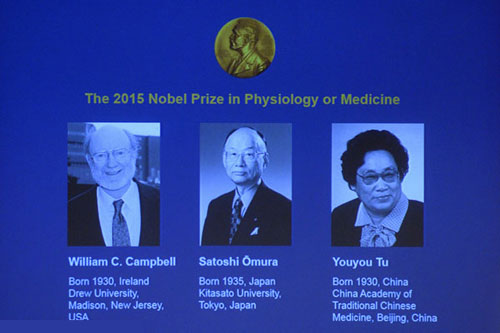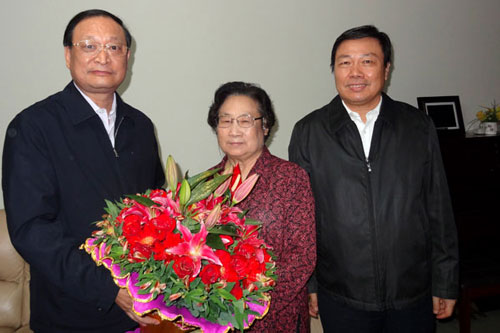
William Campbell, Satoshi Omura and Tu Youyou jointly won the 2015 Nobel Prize for medicine for their work against parasitic diseases.
Eighty-five-year old Chinese pharmacologist Tu Youyou became China's first medicine Nobel laureate when it was announced she was one of three scientists awarded the 2015 Nobel Prize in Physiology or Medicine for their work in developing effective drugs against parasitic diseases.
William C. Campbell and Satoshi Ōmura were recognized for their novel therapy against infections caused by roundworm parasites.
While Tu was honored for developing Artemisinin, a drug therapy for malaria that has saved millions of lives across the globe, especially in the developing world, the Nobel Assembly at Karolinska Institute disclosed on its website on Monday.
Tu, a Chinese trained pharmacologist and a researcher at the China Academy of Chinese Medical Sciences in Beijing, would like to go to Oslo, Norway in December to receive her award in person, according to Cao Hongxin, the science and technology department head of the State Administration of Traditional Chinese Medicine, and former director of the academy.
Tu was honored for her work in isolating the active ingredient from the plant Artemisia apiacea Hance that protects against the malaria parasite and developing an extraction method for its therapeuetic use.
Her great findings spearheaded the exploration for the modernization of TCM as well, he added.
In 1969, Tu started to chair a government project aimed at eradicating malaria.
"The task I took on was to conduct research for a new drug from traditional Chinese herbal medicine to treat malaria. Back then, we needed a totally new structured antimalarial to deal with resistance to the existing drugs. So with that background, I accepted the task assigned by the government," Tu said in an earlier report by China Radio International.

Tu Youyou (C) poses for a picture with Chinese officials in Beijing, China, October 5, 2015 after she was awarded the Nobel Prize in Medicine.